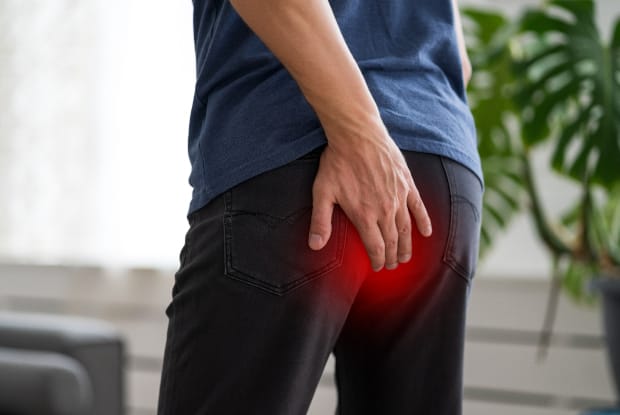Table of Contents
I. What are Gastrointestinal Diseases?
II. Functional vs. Structural Gastrointestinal Diseases
III. How to Improve Constipation
IV. Common Gastrointestinal Diseases
c. Gastroesophageal reflux disease
What are Gastrointestinal Diseases?
The gastrointestinal (GI) tract extends from the mouth to the anus. A gastrointestinal disorder refers to any condition that affects the GI tract. Gastrointestinal diseases may be difficult to diagnose because there is often no indication of damage to the GI tract. The good news is that most gastrointestinal diseases are treatable with the right prescriptions.
If you have a prescription for a GI disorder, getting your medication from an online Canadian pharmacy like Canadian Pharmacy Service can help you save big. On our site, you can find drugs such as Xifaxan (rifaximin), Asacol (mesalamine), and Prilosec (omeprazole). Canadian Pharmacy Service also carries generic versions to help you save even more. Read on to learn about common GI disorders like irritable bowel syndrome (IBS), hemorrhoids, and gastroesophageal reflux disease (GERD).
Functional vs. Structural Gastrointestinal Diseases
Gastrointestinal disorders can be categorized as functional or structural. With functional diseases, the GI track appears completely normal under examination. Conversely, structural GI disorders deform the bowel and cause the GI tract to look abnormal.
Common functional GI disorders include irritable bowel syndrome (IBS), gastroesophageal reflux disease (GERD), and constipation. These conditions may be caused by several factors, such as: The overuse of some diarrhea medications can weaken the bowel over time. Weak bowel muscles often lead to reduced bowel movements and cause chronic constipation. If you often hold in your stool and resist urges to have a bowel movement, you are at a higher risk of functional GI disorders. Finally, pregnancy may be a risk factor for some GI disorders. If you are pregnant, talk to your doctor for ways to treat your GI condition without harming yourself or your baby. Common structural GI diseases include hemorrhoids, colon cancer, and inflammatory bowel disease. Structural GI disorders may cause abnormalities in the GI tract that require surgical removal. Colon cancer, also called colorectal cancer, is the second most common form of cancer in the United States. Every year, approximately 130,000 Americans are diagnosed with this disease. [1] Colorectal cancer usually begins with benign growths in the tissues that line the colon. The painless removal of these growths can lower your risk of colorectal cancer. To prevent structural GI disorders, it is important to attend regular screenings and checkups. Constipation occurs when you have difficulty passing stool. If you have less than three bowel movements a week, you may be diagnosed with constipation. This GI disorder typically occurs because there is not enough fiber in your diet. Constipated patients strain more during bowel movements, which can lead to other conditions like hemorrhoids. To improve your constipation, you can regularly exercise, increase your fiber intake, and pass stool when the urge arises. Resisting the urge to have a bowel movement is a major cause of constipation. IBS is a common form of functional GI disorder that can cause chronic discomfort. With treatment, most people will not experience severe symptoms. IBS is also called spastic colitis or mucous colitis. Symptoms of IBS tend to change over time and generally improve as the patient learns to manage their diet, lifestyle, and treatment. Irritable bowel syndrome can cause symptoms like excess gas, abdominal swelling, and the urgent need to pass stool. [2] Most patients experience periods of relief between flare-ups. Each individual is different, but symptoms of IBS generally worsen after meals. Visit our health and wellness journal for detailed information about the symptoms of IBS. Hemorrhoids are a structural GI disease characterized by dilated and swollen veins near the opening of the anus. Hemorrhoids are linked to constipation because they are commonly caused by straining during a bowel movement. Additionally, hemorrhoids are linked to persistent diarrhea. There are internal and external hemorrhoids. Internal hemorrhoids cause bleeding and irritation on the inside of the anal opening. Internal hemorrhoids can be treated by improving your bowel movements, either medically or with lifestyle changes. However, external hemorrhoids often burst and form blood clots under the skin. This condition, also known as “pile,” can cause extreme pain and may require surgical removal. GERD is diagnosed if a person experiences stomach acid that flows back up the esophagus (acid reflux) more than twice a week. Over time, GERD can cause damage to the tissues in the esophagus. Typically, this GI disorder is caused by a damaged valve between the stomach and the esophagus. [3] Maintaining a healthy weight, quitting smoking, and reducing stress can improve symptoms of GERD. Medically, GERD may be treated with proton pump inhibitors (PPIs) like Prilosec (omeprazole). If your GERD treatment is ineffective, your doctor or gastroenterologist may suggest surgery to improve symptoms. Surgical options for GERD include a fundoplication and an endoscopic procedure. A fundoplication involves sewing the top of the stomach around the esophagus, reducing acid reflux by adding pressure to the lower part of the esophagus. Several kinds of endoscopic procedures exist, including endoscopic sewing and radiofrequency that tighten the sphincter muscle. If you have a gastrointestinal disorder, it is important to see your doctor for a proper diagnosis. Your prescribed treatment method will depend on the condition at hand. Gastrointestinal diseases are not limited to the ones discussed here. Other GI disorders may include celiac disease, Crohn’s disease, pancreatitis, gastritis, and more. Many of these GI disorders can be prevented or treated. You can stay one step ahead of these GI diseases by maintaining a healthy and active lifestyle, practicing good bowel habits, and attending regular screenings. If you have been diagnosed with IBS, GERD, or hemorrhoids, ask your doctor if drugs like Xifaxan or omeprazole are right for you. To fill a prescription, visit the Canadian Pharmacy Service homepage to search for your medication. The content in this article is intended for informational purposes only. This website does not provide medical advice. In all circumstances, you should always seek the advice of your physician and/or other qualified health professionals(s) for drug, medical condition, or treatment advice. The content provided on this website is not a substitute for professional medical advice, diagnosis, or treatment.
a. Functional GI Disorders
b. Structural GI Disorders
How to Improve Constipation

Common Gastrointestinal Disorders
a. Irritable Bowel Syndrome
b. Hemorrhoids

c. Gastroesophageal reflux disease
How are Gastrointestinal Disorders treated?
